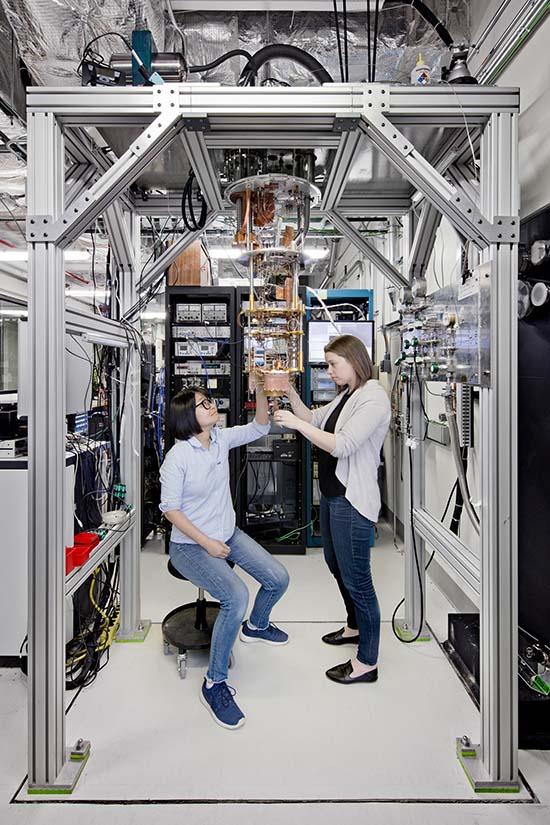量子計(jì)算機(jī)恐將威脅網(wǎng)絡(luò)安全,,必須立刻行動(dòng)起來
|
在約克敦海茨托馬斯·J·沃森研究中心埃羅·沙里寧風(fēng)格的空曠外部區(qū)域,,穿著藍(lán)色牛仔褲的IBM研究員正在組裝遵循量子力學(xué)規(guī)則打造的新一代超級(jí)計(jì)算機(jī)。這些充滿未來氣息的機(jī)器掛在穩(wěn)定的金屬支架上,,看起來就像金色的枝形吊燈,,或是機(jī)器蜂房。這些設(shè)備在真空的超低溫制冷箱內(nèi)仿佛魔術(shù)般運(yùn)轉(zhuǎn)著,。該技術(shù)可謂集智慧與美麗于一身,。 這些量子計(jì)算機(jī)通過未來的迭代,可以解決普通計(jì)算機(jī)無望處理的數(shù)學(xué)問題,。它們會(huì)極大提升經(jīng)典計(jì)算的速度,,準(zhǔn)確模擬化學(xué)反應(yīng)等復(fù)雜的自然現(xiàn)象,開辟有待科學(xué)探索的全新未知領(lǐng)域,。盡管看起來有些神秘,,但這類機(jī)器會(huì)觸及從藥品研發(fā)到數(shù)字安全等我們生活的方方面面。 |
Inside the stark and sweeping Eero Saarinen-styled exterior of the Thomas J. Watson Research Center in Yorktown Heights, IBM’s blue jeans-wearing boffins are assembling a new generation of super-powered computers built on quantum mechanical principles. These otherworldly machines dangle from sturdy, metal frames, looking like golden chandeliers, or robotic beehives. The devices perform their magical-seeming operations inside vacuum-sealed, super-cooled refrigerator encasements. It’s a technology that combines both brains and beauty. Future iterations of these quantum computers will be able to solve mathematical problems ordinary computers have no hope of computing. They will vastly speed up classical calculations, accurately model complex natural phenomena like chemical reactions, and open as yet unexplored frontiers for scientific inquiry. Despite seeming arcane, machines like these will touch every aspect of our lives—from drug discovery to digital security. |

|
后面所說的這個(gè)領(lǐng)域帶來了巨大的挑戰(zhàn),。量子計(jì)算機(jī)相比普通計(jì)算機(jī)的一大優(yōu)勢在于擅長處理海量數(shù)據(jù),這項(xiàng)工作對(duì)當(dāng)今的計(jì)算機(jī)難度很大,,以至于它成為了如今所有加密策略的基礎(chǔ),。另一方面,一臺(tái)足夠先進(jìn)的量子計(jì)算機(jī)能夠勢如破竹地解決這些數(shù)學(xué)問題,,就像電影《異形》(Alien)系列里異形的血液熔化鋼鐵那樣,。量子計(jì)算的前景迫使人們對(duì)密碼學(xué)進(jìn)行徹底的重新思考。 如今的加密手段遭到淘汰的速度可能會(huì)比大多數(shù)人預(yù)測得還要更快,。谷歌(Google)的高級(jí)軟件工程師亞當(dāng)·蘭利最近在一篇博文中指出,,一些專家預(yù)測這種當(dāng)代的“千年蟲漏洞”可能會(huì)在十年之內(nèi)出現(xiàn)。安大略省滑鐵盧的量子計(jì)算研究所(Institute for Quantum Computing)的聯(lián)合創(chuàng)始人米歇爾·莫斯卡預(yù)測在2026年之前,,量子技術(shù)有七分之一的概率會(huì)取得突破,,破解如今常見的加密標(biāo)準(zhǔn)RSA-2048。如果真的如此,,那么重新構(gòu)建數(shù)字防線的最佳時(shí)間就是現(xiàn)在,。正如蘭利所述,空等別人指導(dǎo)如何設(shè)立標(biāo)準(zhǔn)“看起來很危險(xiǎn)”,,沒有時(shí)間可以浪費(fèi)了,。 美國國家科學(xué)、工程和醫(yī)學(xué)院(National Academies of Sciences, Engineering, and Medicine)最近的一篇論文支持了蘭利的觀點(diǎn),。這一研究機(jī)構(gòu)認(rèn)為,,盡管破解加密手段的量子計(jì)算機(jī)不太可能在十年之內(nèi)出現(xiàn),但必須盡快著手準(zhǔn)備防御措施。與論文一起發(fā)布的通訊稿表示,,由于網(wǎng)絡(luò)標(biāo)準(zhǔn)需要超過十年時(shí)間才能實(shí)施,,研發(fā)能夠抵抗攻擊的新算法“如今至關(guān)重要”。 量子計(jì)算的時(shí)代正在迅速到來,。IBM,、谷歌、微軟(Microsoft),、英特爾(Intel)等《財(cái)富》美國500強(qiáng)公司正在與加利福尼亞州的Rigetti等小型初創(chuàng)公司一起鉆研這項(xiàng)技術(shù),。與此同時(shí),中國和其他國家也在它的研發(fā)上投入了數(shù)十億美元,。無論哪個(gè)國家率先掌握了所謂的量子霸權(quán),,就會(huì)發(fā)現(xiàn)自己擁有了前所未有的權(quán)力——相當(dāng)于獲得了互聯(lián)網(wǎng)的X射線透視鏡。 也就是說,,我們得緊急武裝自己了,。(財(cái)富中文網(wǎng)) 譯者:嚴(yán)匡正 |
This latter area presents significant challenges. One advantage quantum computers have over traditional ones is a knack for factoring large numbers, an operation so difficult for present-day computers that it has become the foundation for almost all today’s encryption schemes. A sufficiently advanced quantum computer, on the other hand, can chew through these math problems with the destructive force of that metal-melting Xenomorph blood in the Alien film franchise. The prospect of quantum computing necessitates a complete rethinking of cryptography. Today’s encryption may be rendered obsolete sooner than most people anticipate. As Adam Langley, a senior software engineer at Google, has pointed out in a recent blog post, some experts predict this latter-day Y2K could occur within the decade. Michele Mosca, cofounder of the Institute for Quantum Computing in Waterloo, Ontario, has estimated a 1-in-7 chance that quantum breakthroughs will defeat RSA-2048, a common encryption standard, by 2026. If that’s true, then the time to begin reengineering our digital defenses is now. As Langley writes, waiting around for guidance on standards “seems dangerous”; there’s no time to lose. Buttressing Langley’s view is a recent paper out of the National Academies of Sciences, Engineering, and Medicine. The research organization determined that, while the advent of an encryption-busting quantum computer is unlikely within the decade, preparations to defend against one must be undertaken as soon as possible. Since web standards take more than a decade to implement, a press release accompanying the paper warned, developing new, attack-resistant algorithms “is critical now.” The era of quantum computation fast approaches. Fortune 500 companies like IBM, Google, Microsoft, and Intel, are plugging away on the tech alongside smaller startups, like Calif.-based Rigetti. Nation states like China are, meanwhile, dumping billions of dollars into research and development. Whichever entity achieves so-called quantum supremacy first will find itself in possession of unprecedented power—the equivalent of X-Ray goggles for the Internet. That is, unless we act with urgency to armor up. |
-
熱讀文章
-
熱門視頻











